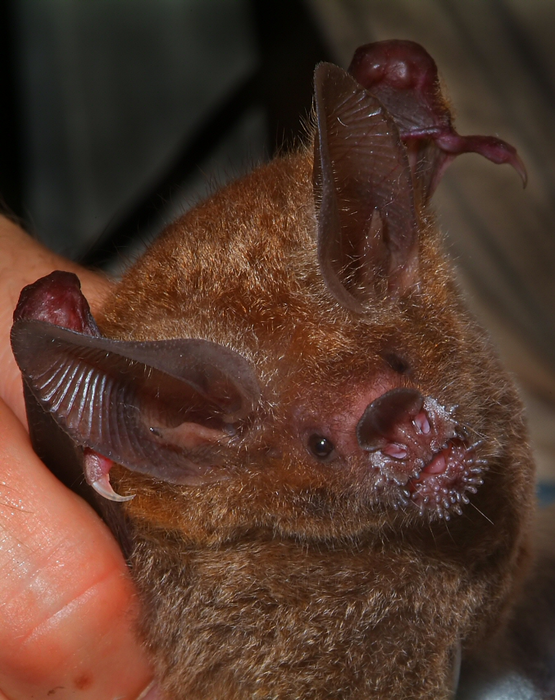COLUMBUS, Ohio – Frog-eating bats trained by researchers to associate a phone ringtone with a tasty treat were able to remember what they learned for up to four years in the wild, new research has found.

Credit: Photo by Marcos Guerra
COLUMBUS, Ohio – Frog-eating bats trained by researchers to associate a phone ringtone with a tasty treat were able to remember what they learned for up to four years in the wild, new research has found.
The study acquainted 49 bats with a series of ringtones that attracted their attention, and trained them to associate flying toward just one of the tones with a reward: a baitfish snack.
Between one and four years later, eight of those bats were recaptured and exposed again to the food-related ringtone. All of them flew toward the sound, and six flew all the way to the speaker and grabbed the food reward, meaning they expected to find food. Control bats without previous training on the sounds were comparatively unmoved by the exposure to the unfamiliar tones.
“I was surprised – I went into this thinking that at least a year would be a reasonable time for them to remember, given all the other things they need to know and given that long-term memory does have real costs. Four years strikes me as a long time to hold on to a sound that you might never hear again,” said lead author May Dixon, a postdoctoral scholar in evolution, ecology and organismal biology at The Ohio State University.
Dixon led this study at the Smithsonian Tropical Research Institute in Panama while she was a graduate student at the University of Texas at Austin.
“The environment that previous generations experienced can be extremely different from the environment an animal is born into – and it may also change throughout an animal’s life,” she said. “Trying to figure out how animals use learning and memory is one way to figure out how they’re going to make it in a life full of change in the modern world.”
The study is published today (June 20, 2022) in Current Biology.
In the first phase, individual frog-eating bats captured for a series of cognition tests were exposed to a highly attractive sound in the lab: the mating call of the male túngara frog, one of this species of bats’ preferred prey. Flying to that sound was rewarded with a piece of baitfish placed on mesh above the speaker.
Over time, the sound was mingled with and gradually replaced by a ringtone, but the reward was the same. Researchers then introduced three other ringtones, none of which was connected to a food reward. Bats were trained to discern the differences and eventually no longer flew toward the unrewarded sounds. Each bat secured at least 40 snacks by flying to the trained ringtone over 11 to 27 days. All bats were microchipped and returned to the wild.
Beginning a year later and for three additional years, Dixon captured bats and identified eight from the initial trial by their microchips. In a follow-up test of their response to the original rewarded ringtone, all eight trained bats quickly flew to the sound and were able to tell the difference between that ringtone and a new, steady tone, though many of the bats did fly to an unrewarded sound from the initial training.
When 17 untrained bats were exposed to these sounds, they mostly twitched their ears in response to the sounds, but didn’t fly toward them.
“The study taught us a lot because there are relatively few studies of long-term memory in wild animals and we don’t have systematic understanding of long-term memories in nature yet,” Dixon said. “If we can collect additional data on different species of bats, we could pick this apart and see what life histories select for long memories.”
The paper lists 39 previous studies that have documented memory in species ranging from fish, birds and bats to goats and primates. Some of the longest of those experiments – documenting memory in sea lions for 10 years, tortoises for nine years and dolphins for 20 years – were all conducted on animals that lived in captivity the entire time.
“Being able to study memory in the wild is important,” said study co-author Gerald Carter, assistant professor of evolution, ecology and organismal biology at Ohio State. “You can’t necessarily extrapolate from the wealth of data we have on animals in the lab to what they’re facing in the wild, where there are many more things they have to remember. The environment is different and the brain is different in the wild versus captivity.”
Despite the human tendency to assume a long memory gives our species the intelligence advantage, nature shows us that memory flexibility – also called adaptive forgetting – may be important for survival.
“It’s not always true that being the smartest or having the longest memory is actually advantageous. Research has shown that fruitflies selected for improved memories can’t compete as well against other fruitflies,” Dixon said. “Just because it’s useful for humans to be so smart and have such good memories doesn’t necessarily mean it’s going to be the best thing for other animals.
“That’s why we want to figure out when these skills are actually going to help animals and when they could be a liability.”
This work was supported by the National Science Foundation and the Smithsonian Tropical Research Institute (STRI). Co-authors include Patricia Jones of Bowdoin College, Michael Ryan of STRI and UT Austin, and Rachel Page of STRI.
#
Contacts:
May Dixon, [email protected]
Gerald Carter, [email protected]
Written by Emily Caldwell, [email protected]; 614-292-8152
Journal
Current Biology
DOI
10.1016/j.cub.2022.05.031
Subject of Research
Animals
Article Title
Long-term memory in frog-eating bats
Article Publication Date
20-Jun-2022




